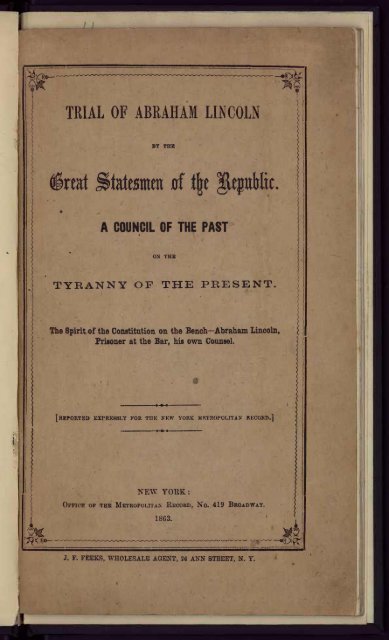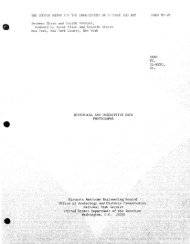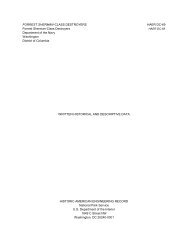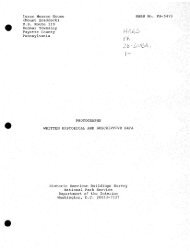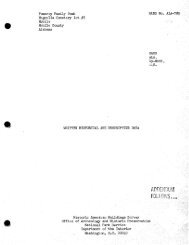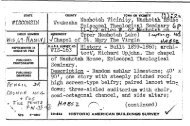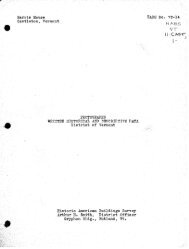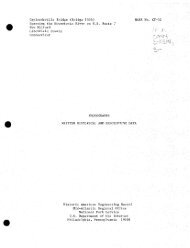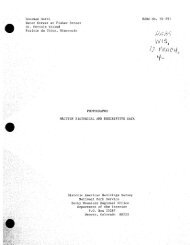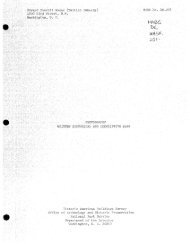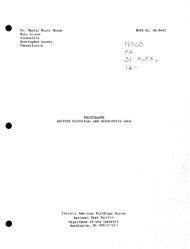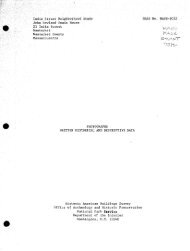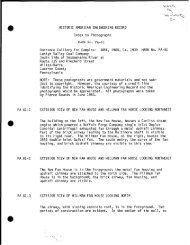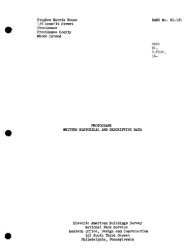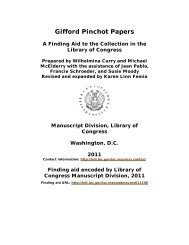TRIAL OF ABRAHAM LINCOLN - American Memory
TRIAL OF ABRAHAM LINCOLN - American Memory
TRIAL OF ABRAHAM LINCOLN - American Memory
Create successful ePaper yourself
Turn your PDF publications into a flip-book with our unique Google optimized e-Paper software.
V<br />
<strong>TRIAL</strong> <strong>OF</strong> <strong>ABRAHAM</strong> <strong>LINCOLN</strong><br />
BT THE<br />
A COUNCIL <strong>OF</strong> THE PAST<br />
OS THE<br />
TYRANNY OP THE PRESENT.<br />
The Spirit of the Constitution on the Bench—Abraham Lincoln,<br />
Prisoner at the Bar, his own Counsel.<br />
[REPORTED EXPRESSLY FOR THE KKW YOHIC MKTROl'OUTAN RECORD.]<br />
NEW YORK:<br />
l <strong>OF</strong>FICE OP THE METROPOLITAN KECORD, NO. 419 BROADWAT.<br />
| 1863.<br />
J. F. FEEKS, WHOLESALE AGENT, 28 ANN STEEET, N. T.
IE F<br />
irese<br />
cop:
IIAL <strong>OF</strong> <strong>ABRAHAM</strong> <strong>LINCOLN</strong> BY THE GREAT STATESMEN<br />
JE REPUBLIC. A Council of the past on the Tyranny of<br />
)resent. 8vo, original wrappers. New York, 1863<br />
copy: a rare item.<br />
<strong>TRIAL</strong> <strong>OF</strong> <strong>ABRAHAM</strong> <strong>LINCOLN</strong><br />
(irat JltetemeH uf % |UpWk<<br />
A COUNCIL <strong>OF</strong> THE PAST<br />
ON THB<br />
TYRANNY <strong>OF</strong> THE PRESENT.<br />
The Spirit of the ConstKntion on the Bench—Abraham Lincoln,<br />
Prisoner at the Bar, his own Counsel.<br />
[RBPOKTED EXPRESSLY FOR TBE NEW YORK METROPOLITAN RECORD.]<br />
NEW YORK:<br />
<strong>OF</strong>FICE OP THE METROPOLITAN EECORD, NO. 419 BROADWAY.<br />
1863.<br />
• Tl
i<br />
iV^'J ^<br />
1, .<br />
V I ,(3<br />
^
<strong>TRIAL</strong> <strong>OF</strong> <strong>ABRAHAM</strong> <strong>LINCOLN</strong><br />
•<br />
GREAT STATESMEN OE THE REPUBLIC.<br />
It was reported some few weeks since that the<br />
present unworthy successor of Washington, the<br />
Abolition President, Abraham Lincoln, had be-<br />
come a, convert to spiritualism, and that he' had re-<br />
cently held a conversation in the White House with<br />
the departed spirits of certain great men of the<br />
Revolution, with whose opinions upon the ultimate<br />
issue of the war he desired to make himself ac-<br />
quainted. The particulars of that spiritualistic<br />
confab have not been published, nor have we been<br />
informed of the result of its deliberations. We<br />
hope, however, that the great rail-splitter was<br />
satisfied with the interview.<br />
Since then, it was the good fortune of the Editor<br />
of the RECORD to have been present at a most re-<br />
'<br />
•<br />
/<br />
•<br />
~T<br />
jy
markable trial that took place not many nights ago<br />
in the principal apartment of the Presidential man-<br />
sion at Washington. It is unnecessary that we<br />
should explain to our readers how we managed to<br />
be present on that occasion. It is sufficient to<br />
know that we were there, and that while there we<br />
were witness to a scene that will remain indelibly<br />
impressed upon our memory. The spacious apart-<br />
ment had been converted into a grand court-room,<br />
and preparations were being made for*a trial of<br />
more than ordinary importance.<br />
On looking around the court we beheld a num-<br />
ber of distinguished historical characters; m6n<br />
whose faces were rendered familiar from the por-<br />
traits which we had seen in books and elsewhere.<br />
Prominent among them was one countenance,<br />
which no man having once seen could ever forget.<br />
It was that of George Washington, the father ol<br />
the <strong>American</strong> Union, who was surrounded by the<br />
great statesmen of the Revolution and by others of<br />
a still later date. Never before in the history of<br />
the world had such an august council ever assem-<br />
bled. What could have brought them together at<br />
such a time, and in such a place ? They had as-<br />
sembled for the trial of the present incumbent of<br />
the Presidential chair on charges of the gravest
I<br />
9<br />
and most serious character. These charges were<br />
numerous, and were brought out in the course of<br />
the examination, which was conducted before the<br />
Spirit of the Constitution, who occupied the bench<br />
of Justice. Immediately confronting the august<br />
assemblage was the figure of a man whose linea-<br />
ments have become painfully familiar to the people.<br />
This figure was the representation of Abraham Lin-<br />
coln, and from the expression of conscious guilt<br />
visible upon his countenance, it w^s evident that<br />
he occupied the position of the criminal at the bar.<br />
He was allowed the 'services of a counsel to con-<br />
duct his defense, but on intimating his desire to<br />
act as his own counsel he was granted that riv-<br />
ilege.<br />
The Spirit of the Constitution announced that<br />
the trial of the culprit would now proceed, where-<br />
upon the venerable form of the Father of his Coun-<br />
try arose in the midst of the spirits of the great<br />
men by whom he was surrounded, and proceeded<br />
to read the following indictment against his last<br />
and most unworthy successor. •<br />
" Abraham Lincoln is herein charged with trea-<br />
sonable intent, purposes, and designs, in having<br />
committed the following unconstitutional acts in<br />
the course of his administration :
6<br />
1. In having declared war against independent and sov-<br />
ereign States under the pretence of repossessing himself of<br />
certain forts and other property seized and held by said<br />
States.<br />
2. In having arrested citizens of the United States, and<br />
incarcerated them in Government bastiles, without process<br />
of law.<br />
3. In having suppressed the liberty of speech, thereby<br />
denying to the citizen the Constitutional right of criticiz-<br />
ing the acts of his Administration.<br />
4. In having prohibited and stopped the publication of<br />
certain newspapers for the exercise of the same right re-<br />
ferred to in the preceding charge.<br />
5. In having placed the military above the civil power,<br />
as shown in the establishment of martial law over portions<br />
of the country which were not embraced within the theatre<br />
of war.<br />
6.'>In overthrowing State sovereignty, as in the case of<br />
Virginia, the integrity of which was violated by the erec-<br />
tion of the so-called State of Kanawha within its limits.<br />
7. In having approved, indorsed, and partially carried<br />
into execution the unconstitutional act of Congress known<br />
as the Confiscation Bill.<br />
• 8. In having approved of the infamous law known as •<br />
the Conscription Act, which was not only subversive of<br />
the Constitution, but violative of State sovereignty.<br />
9. In having attempted to carry into execution the Eman-<br />
cipation Act, thereby viofating the most sacred guarantees<br />
, of the Constitution.
(The indictment embraced a great many other charges,<br />
but those we have enumerated were the most important.)<br />
After the reading of the foregoing, the Spirit of the Con-<br />
stitution, officiating as Supreme Judge in the case, notified<br />
the prisoner that the Court was prepared to hear his de-<br />
fense, whereupon the prisoner, Abraham Lincoln, arose<br />
and addressed the Court.<br />
We should remark, however, that at various points in<br />
the course of his defense he was frequently interrupted by<br />
some one of the many great statesmen who had assembled<br />
to witness and take part in the trial.<br />
'<br />
The following is a verbatim report of the proceedings :<br />
ABEAHAM <strong>LINCOLN</strong>.—I have been accused of violating<br />
the Constitution ; but if I have done so, it has been from<br />
the sole and earnest desire to restore the Union.<br />
STEPHEN A. DOUGLAS.—d don't understand how a man<br />
can claim to be a friend of the Union, and yet be in favor<br />
of war upon ten millions of people in the Union. You can<br />
not cover it up much longer under the pretext of love for<br />
the Union. War is disunion, certain, inevitable, final, and<br />
irrepressible. Peace is the only policy that can save the<br />
country.*<br />
<strong>ABRAHAM</strong> <strong>LINCOLN</strong>.—It was this desire to preserve the<br />
* Douglas' last speech in the United States Senate.
integrity of the Republic that rendered it a matter of ab-<br />
solute necessity to put a stop to the assaults that were be-<br />
ing made upon the Government by certain parties whom I<br />
regarded as friendly to the rebels.<br />
;<br />
DANIEL WEBSTER.—Free speech is a home-bred right, a<br />
fireside privilege. It has everbeea-enjoyed in every house,<br />
cottage, and cabin in the nation. It is not to be drawn<br />
into controversy. It is as undoubted as the right of breath-<br />
ing the air and walking on the earth. It is a right to be<br />
maintained in peace and in war. It is a right which can<br />
not be invaded without destroying constitutional liberty.<br />
Hence this right should be guarded and protected by the<br />
freemen of this country with a jealous care unless they are<br />
prepared for chains and anarchy.*<br />
<strong>ABRAHAM</strong> <strong>LINCOLN</strong>.—The great cause of all our trouble<br />
is slavery, and wo can never expect to have peace until<br />
that institution is abolished.<br />
HENRY CLAY -Abolitionism ! "With abolitionists the<br />
rights of property are nothing ; the deficiency of the powers<br />
of the general government is nothing ; the acknowledged<br />
and incontestable powers of the States are nothing ; a disso-<br />
lution of the Union and the overthrow of a government in<br />
which are concentrated the hopes of the civilized world are<br />
nothing; a single idea has taken possession of their minds.<br />
t Great oration of Daniel Webster on free speech in 18U.
9<br />
and onward they pursue it, overlooking all barriers, reck-<br />
less and regardless of all consequences*<br />
<strong>ABRAHAM</strong> <strong>LINCOLN</strong>.—If every man was allowed to ex-<br />
press his opinions the prosecution of the war for the Union<br />
would be impossible. The government is obliged to have<br />
recourse to such measures itji would preserve its own ex-<br />
istence.<br />
•<br />
JOHN HANCOCI?.—It is to the last degree vicious and in-<br />
famous to attempt to support a government which mani-<br />
festly tends to render the persons and proprty of the<br />
governed insecure. Some boast of being friends to govern-<br />
ment ; I am a friend to righteous government, to a gov-<br />
ernment founded upon the principles of reason and justice ;<br />
but I glory in publicly avowing my eternal enmity to<br />
tyranny.f<br />
<strong>ABRAHAM</strong> <strong>LINCOLN</strong>.—I found it necessary to suspend the<br />
operation of portions of the Constitution the better to en-<br />
able mc to carry on the war without embarrassment. I<br />
thought that the people would be willing to relinquish some<br />
of their constitutional rights for a time if their liberties<br />
could thereby be preserved in the future.<br />
* Speech of Henry Clay against the insidious policy of the abolitionists.<br />
t From the speech of John Hancock, delivered at Boston in 1774, on the<br />
occa^on of the celebration of the anniversary of the Boston massacre of
10<br />
PATRICK HENRY.—Is the relinquishment of the trial by<br />
jury and the liberty of the press necessary for your liberty ?<br />
Will the abandonment of the most sacred rights tend to<br />
the security of your liberty ? Liberty, the greatest of all<br />
earthly blessings! give us that precious jewel, and you may<br />
take every thing else. The first thing I have at heart is<br />
<strong>American</strong> liberty ; the second thing is <strong>American</strong> union.*<br />
<strong>ABRAHAM</strong> <strong>LINCOLN</strong>.—I endeavored to get along in the<br />
prosecution of the war for the Union, but finding that the<br />
Constitution interfered with it, I was obliged, as a military<br />
necessity, to suspend its action.<br />
GOUVERNEUR MORRIS.—I love the Constitution, and 1<br />
love it because I consider it as the bond of our Union ; be-<br />
cause in my soul I believe that on it depends our harmony<br />
and our peace ; that, without it, we should soon be plunged<br />
in all the horrors of civil war ; that this country would be<br />
deluged with the blood of its inhabitants, and a brother's<br />
hand raised against the bosom of a brother .t<br />
<strong>ABRAHAM</strong> <strong>LINCOLN</strong>.—What was I to do in the midst of<br />
civil war ? I found my hands tied by the checks of the<br />
Constitution, and I was forced to disregard them. I could<br />
not rely altogether upon the people.<br />
* Speech of Patrick Henry on the Federal Constitution.<br />
t Speech of Gouverneur Morris in the United States Senate on the 14th of<br />
January, 1802, on an act to provide for the more convenient organization<br />
of the Courts of the United States.
11<br />
ALEXANDER HAMILTON.—The confidence of the people<br />
will easily be gained by a good administration. This is<br />
the true touchstone,*<br />
<strong>ABRAHAM</strong> <strong>LINCOLN</strong>.—I must insist, in my own defense,<br />
that without force the Union can not be preserved. And<br />
every law such as the Conscription act and the Emancipa-<br />
tion measure must be enforced.<br />
JOHN C. CALHOUN.—The law must be enforced ! The<br />
imperial edifet must bo executed!' It is under such sophis-<br />
try, couched in general terms, without looking to the limi-<br />
tations which must ever exist in the practical exercise of<br />
power, that the most cruel and despotic acts ever have been<br />
covered. It was such sophistry as this that cast Daniel<br />
into the lions' den and the three Innocents into the fiery<br />
furnace. Under the same sophistry the bloody edicts of<br />
Nero and Caligula were executed. The law must be en-<br />
forced ! Yes, the law imposing the " tea tax must be ex-<br />
ecuted." This was the very argument which impelled<br />
Lord North and his administration to that mad career<br />
which forever separated us from the British crown. In<br />
the same spirit, we are told the Union must be preserved,<br />
without regard to the means. And how is it proposed to<br />
preserve the Union? By force? Does any man is his<br />
senses believe that this beautiful structure, this harmonious<br />
aggregate of States, produced by the joint consent of all,<br />
-<br />
* Alexander Hamilton's speech in the New York Convention in 1788.
12<br />
can be preserved by force ? Its very introduction would<br />
be certain destruction of tins Federal Union. No, no'!<br />
Y6u can not keep the States united in their Constitutional<br />
and Federal bonds by force. Force may indeed hold the<br />
parts together, but such Union would be the bond between<br />
master and slave, a Union of exaction on one side and of<br />
unqualified obedience on the other. Disguise it as you<br />
may, the contest is one between power and liberty. * *<br />
Never was there a controversy in which more important<br />
ccnscqucnces were involved, not excepting that between<br />
Persia and Greece, decided by the battles of Marathan,<br />
Flat£ea, and.Salamis, which gave ascendency to the genius of<br />
Europe over thatof Asia, and which in its consequences has<br />
continued to affect the destiny of so large a portion of the<br />
world, even to this day. In the great conflict between<br />
Greece and Persia, between European and Asiatic polity<br />
and civilization, the very question between the federal and<br />
consolidated forms of government was involved. The<br />
Asiatic governments from the remotest time, with some ex-<br />
ceptions on the eastern shore of the Mediterranean, have<br />
been based on the principle of consolidation, which con-<br />
siders the whole community as but a unit, and consolidates<br />
its powers in a central point. The opposite principle has<br />
prevailed in Europe. Greece throughout all her States<br />
was based on a federal system—all were united in one<br />
common but loose bond, and the governments of the sev-<br />
eral states partook for the most part of a complex organi-<br />
sation, which distributed political power among diiferent<br />
members of the community. * * Has reason fled
from our borders ? Have we ceased to reflect ? 11 is mad-<br />
ness to suppose the Union can be preserved by force *<br />
JAMES MADISON.—The more I reflect on the use of force<br />
the more I doubt the practicability, the justice, and the<br />
efficacy of it when applied to a people collectively and not<br />
individually. A union of the States containing such an<br />
ingredient seems to provide for its own destruction. The<br />
ube of force against a State would look more like a decla-<br />
ration of war than an infliction of punishment, and would<br />
probably be considered by the party attacked as a dissolu-<br />
tion of all previous compacts by which it might bo bound.f<br />
ABKAHAM <strong>LINCOLN</strong>.—Without force it is impossible to<br />
preserve the government. The military, whan necessary,<br />
must sustain the civil- power.<br />
ALEX. HAMILTON.—HOW can this force be exerted on the<br />
States collectively ? It is impossible. It amounts to a<br />
war between the parties. Foreign powers, also, will not<br />
be idle spectators. They will interpose; the confusion<br />
will increase, and a dissolution of the Union will ensue.J<br />
COLONEL MASON.—The most jarring elements, fire and<br />
water, are not more incompatible than such a strange mix-<br />
* Speech of John C. Calh^un in 1833 against the Force Bill,<br />
t Speech of Madison in the Federal Convention that framed the Consti-<br />
tution. See Madison Papers, vol. ii., p. 761.<br />
t Speech of Hamilton in the eame Convention. See Madison Papers,<br />
vol. ii., p. 892.
14<br />
ture of civil liberty and military execution. Will the<br />
militia march from one State to another for the purpose of<br />
coercion? If they do, will not the citizens of invaded<br />
States assist one another, until they arise as one man and<br />
shake off what they will denounce as the hated Union<br />
altogether. If you subjugate them, how are jou to hold<br />
them under a Constitution that is to be imposed to ensure<br />
domestic tranquillity and promote the general welfare ?*<br />
<strong>ABRAHAM</strong> <strong>LINCOLN</strong>.—Am I, then, to be invested with no<br />
power for the suppression of rebellion ?<br />
ELBRIPGB GEBEY.—I am against letting loose the myr-<br />
midons of the United States on a State without its own<br />
consent.t<br />
' <strong>ABRAHAM</strong> <strong>LINCOLN</strong>.—There can be no union unless the<br />
State governments sustain the General Government to the<br />
fullest extent in putting down disobedient and refractory<br />
States.<br />
•<br />
ELBEIDGE GERRY.—Let us, then, at once destroy the<br />
State governments, have an executive for life, or here-<br />
ditary, and then there will be some consistency in giving<br />
full powers to the General Government; but, as the State<br />
' Speech of Mr. Mason, of Virginia, in same Conyention. Madison Pa-<br />
pers, vol. ii., pp. 914-15.<br />
f See Madison Papers, vol. iii., from pp. 1349 to 1353
•<br />
15<br />
must not be abolished, I wonder at the attempts that are<br />
made to give powers that are inconsistent with their exist-<br />
ence. I warn you against pushing the experiment too far.<br />
Some people will support a plan of vigorous government<br />
at every risk. Others, of a more democratic cast, will op-<br />
pose it with equal determination, and a civil war may be<br />
produced by the conflict*<br />
<strong>ABRAHAM</strong> <strong>LINCOLN</strong>.—In my endeavors to sustain the<br />
Constitution, it is possible that I have transcended the<br />
powers with which that instrument has invested me ; but I<br />
have done so to maintain the Union and the Constitution.<br />
ANDEEW JACKSON.—But the Constitution can not be<br />
maiatained, nor the Union preserved, in opposition to the<br />
public feeling, by the mere exertion of the coercive powers<br />
confided to the General Government; the foundations<br />
must be laid in the affections of the people, in the security-<br />
it gives to life, liberty, character, and property in every<br />
quarter of the country, and in the fraternal attachment<br />
which thecitizens of the several States bear to one another,<br />
as members of one political family mutually contributing<br />
to promote the happiness of each other.t<br />
<strong>ABRAHAM</strong> <strong>LINCOLN</strong>.—If the Union be the only bond by<br />
which the sovereignty of the States is to be preserved, then<br />
. ' " '<br />
* See Madison Papers, vol. iii, from pp. 1402 to 1408.<br />
t Jackson's Farewell Address, Washington, March 3, 1837.
16<br />
the States themselves must abandon temporarily a portion<br />
of their power—more than is granted even in the Constitu-<br />
tion—to attain so desirable an end as the preservation of<br />
the republic.<br />
ANDREW JACKSON.—The legitimate authority of the<br />
Government is abundantly sufficient for all the purposes<br />
for which it was created ; and its powers being expressly<br />
enumerated there can be no justification for claiming any-<br />
thing beyond them. Every attempt to exercise power be<br />
yond these limits should be promptly and firmly opposed ;<br />
for one evil example will lead to other measures still more<br />
mischievous ; and if the principle of constructive powers,<br />
or supposed advantages, or temporary circumstances, shall<br />
ever be permitted to justify the assumption of a power not<br />
given by the Constitution, the General Government will,<br />
before long, absorb all the powers' of legislation, and you<br />
will have, in effect, but one consolidated Government.<br />
From the extent of our country, its diversified interests,<br />
different pursuits, and different habits, it is too obvious for<br />
argument that a single consolidated Government would be<br />
wholly inadequate to watch over and protect its interests ;<br />
and every friend of our free institutions should always pre-<br />
pare to maintain, unimpaired and in full vigor, the rights<br />
and sovereignty of the States*<br />
<strong>ABRAHAM</strong> <strong>LINCOLN</strong>.—It is impossible for this govern-<br />
ment to exist half slave and half free. The institution of<br />
* Jackson's Farewell Address, Washington, March 3, 1837.<br />
•<br />
' )
17<br />
slavery must, thei-cfore, go down. It is inhuman, and as<br />
an evil should be eradicated.<br />
ASDREW JACKSON.—Each State has the unquestionable<br />
right to regulate its own internal concerns according to its<br />
own pleasure ; and while it docs not interfere with the<br />
rights of the people of other States, or the rights of the<br />
Union, every State must be the sole judge of the measures<br />
proper to secure the safety of its citizens and promote their<br />
happiness ; and all efforts on the part of the people of the<br />
States to cast odium on their institutions, and all measures<br />
calculated to disturb their rights of property, or to put<br />
in jeopardy their peace and internal tranquillity, are in<br />
direct opposition to the spirit in which the Union .was<br />
founded, and must endanger its safety. Motives of philan-<br />
thropy may be assigned to their unwarrantable interference,<br />
and weak men may persuade themselves for a moment that<br />
they are laboring in the cause of humanity, and asserting<br />
the rights of the human race ; but every one, upon sober<br />
reflection, will see that nothing but mischief can come from<br />
these improper assaults upon the feelings and rights of<br />
others. Rest assured that the men found busy in the work<br />
of discord are not worthy of confidence, and deserve the<br />
strongest reprobation.*<br />
<strong>ABRAHAM</strong> <strong>LINCOLN</strong>.—It was the Union that created the<br />
States, and, therefore, the States being subordinate, must<br />
* Jacksou's Farewell Address, Washington, March 3, 1837.<br />
2
18<br />
submit to the authority and power of the General Govern-<br />
ment.<br />
ALEXANDER HAMILTON.—The States can never lose<br />
their powers till the whole people of America are robbed<br />
of their liberties. These must go together. They must<br />
support each other or meet a common fate. The Constitu-<br />
tion is framed upon truly republican principles, and as it is<br />
expressly designed for a common protection and the general<br />
welfare of the United States, it must be utterly repugnant<br />
to this Constitution to subvert the State governments or<br />
oppress the people. The coercion of States is one of the<br />
maddest projects that was ever devised. A failure of com-<br />
pliance will never be confined to a single State. This<br />
being the case, can we suppose it wise to hazard a civil<br />
war? It would be a nation at war with itself. Can any<br />
reasonable man be well disposed toward a government<br />
that makes war and carnage the only means of supporting<br />
itself—a government that can exist only by the sword?<br />
Every such war must involve the innocent with the guilty.<br />
This single consideration should not be inefficient to dis-<br />
pose every peaceable citizen against such a governmest.<br />
The State Governments are absolutely necessary to the<br />
system. Their existence must form a leading principle in<br />
the most perfect Constitution we could form: I insist<br />
that it never can be the interest or desire of the national<br />
legislature to destroy the State Governments. It can de-<br />
rive no advantage from such an event; but, on the con-<br />
trary, would lose an indispensable support, a necessary aid<br />
in executing the laws, and conveying the influence of Gov-
LL<br />
19<br />
ernment to the doors of the people. The Union is depend-<br />
ent on the will of the State aovernments for its chief<br />
magistrate and for its Senate. The blow aimed at the<br />
members must give a fatal wound to the head, and the de-<br />
struction of the States must be at once a political suicide.<br />
The State establishments of civil and military officers of<br />
every description, infinitely surpassing in numbers any pos-<br />
sible correspondent establishments in the General Govern-<br />
ment, will create such an extent and complication of attach-<br />
ments as will ever secure the predilection and support of<br />
the people. Whenever, therefore, any infringement of the<br />
State Constitutions is meditated, the great body of the<br />
people naturally take part with their domestic representa-<br />
tives. Can the General Government withstand such a<br />
united opposition? Will the people suffer themselves to<br />
be stripped of their privileges? Will they suffer their<br />
legislature to be reduced to a shadow and a name? The<br />
idea is shocking to common sense *<br />
<strong>ABRAHAM</strong> <strong>LINCOLN</strong>.—The Government must prove that<br />
it is supreme, and has the power to enforce obedience, or<br />
it is a mockery to call it a government. Its power, there-<br />
fore, to coerce States in rebellion, must be admitted as a<br />
fundamental principle of its existence.<br />
ALEXANDER HAMILTON.—Whoever considers the popu-<br />
lousness and strength of several of these States singly at<br />
• Extracts from Bpeech of Alexander Hamilton on Federal Constitution.
20<br />
tlie present juncture, and looks forward to what they will<br />
become even at the distarfce of half a century, will at once<br />
dismiss as idle and visionary any scheme which aims at<br />
regulating them or coercing them in their collective capa-<br />
cities by the General Government. A project of this kind<br />
is little less romantic than the monster-taming spirit at-<br />
tributed to the fabulous heroes and demi-gods of antiquity.<br />
Even in those Confederacies which have been composed of<br />
members smaller than many of our counties, the principle<br />
of legislation for sovereign States, supported by military<br />
coercion, has never been found effectual. It has rarely<br />
been attempted to be employed against the weaker mem-<br />
bers ; and in most instances attempts thus to coerce the re-<br />
fractory and disobedient have been the signals of bloody<br />
wars, in which one half the confederacy has displayed its<br />
banners against the other. We want no such government<br />
as this *<br />
<strong>ABRAHAM</strong> <strong>LINCOLN</strong>.—"What does government mean, but<br />
power and authority over the governed ? If the people<br />
will not sustain the government, then it is clearly the right<br />
of the government to sustain itself. It would be impossi-<br />
ble to do this if I am to be bound by the checks and re-<br />
straints of the Constitution.<br />
THOMAS JEFFERSON.—Government is now'taking so<br />
gteady a course as to show by what road it will pass to<br />
f See letter of Alexander Hamilton in No. 16 of " The Federalist."
21<br />
destruction, to wit: by consolidation first, and then corrup-<br />
tion, its necessary consequence. * * A prevalence of<br />
the doctrines of consolidation will one day call for reform-<br />
ation or revolution. * * I see with the deepest af-<br />
fliction the rapid strides with which the Federal branch<br />
of our Government is advancing toward usurpation of all<br />
the rights reserved to the States, and the consolidation in<br />
itself of all power, foreign and domestic, and that, too, by<br />
constructions which, if legitimate, leave no limits to their<br />
power.<br />
•<br />
GEORGE WASHINGTON.—It is important that the habit of<br />
thinking in a free country should inspire caution in those<br />
intrusted witlyits administration, to confine themselves with-<br />
in their respective constitutional spheres, avoiding, in the<br />
exercise of the powers of one department, to encroach<br />
upon another. The spirit of encroachment tends to con-<br />
solidate the powers of all the departments in one, and thus<br />
create, whatever the form of government, a real despotism.<br />
A just estimate of that love of power and proneness to<br />
abuse it which predominates in the human heart is sufficient<br />
to satisfy us of the truths of this position. The necessity of<br />
reciprocal checks in the exercise of political power, by di-<br />
viding and distributing it into different departments, and<br />
constituting each the guardian of the public weal against<br />
x invasion by the other, has been evinced by experiments an-<br />
• Jeffersorrs Works, by H. A. Washington, vol vii., pp. 223, 293.
22<br />
cient and modern ; some of them in our own country and<br />
under our own eyes. To preserve them must be as neces-<br />
sary as to institute them. If, in the opinion of the people,<br />
the destruction or modification of the constitutional powers<br />
bo in any particular wrong, let it be corrected by an amend-<br />
ment in the way in which the Constitution designates. But<br />
let there be no change by usurpation ; for, though this in<br />
one instance may be the instrument of good, it is the cus-<br />
tomary weapon by which free governments are destroyed.<br />
The precedent must always greatly overbalance in perma-<br />
nent evil any partial or transient benefit which the use may<br />
at any time yield.*<br />
DANIEL WEBSTER.—Through all the history of the con-<br />
test for liberty, executive power has been regarded as a<br />
lion which must be caged. So far from being the object of<br />
? enlightened popular trust—so far from being considered<br />
the natural protector of popular right—it has been dreaded<br />
as the great source of its danger.t<br />
<strong>ABRAHAM</strong> <strong>LINCOLN</strong>.—I repeat, in my own defense, that<br />
power is necessary to government, and that the life of every<br />
able-bodied man in the country should be placed at its dis-<br />
posal to preserve the integrity of the country. In this view<br />
of the case conscription becomes an imperative necessity.<br />
• Washington's Farewell Address,<br />
f Works of Webster, vol. iv., p. 134.
11<br />
23<br />
JUDGR GASTON.—What! are the freemen of this coun-<br />
try to be drafted from the ranks of the militia, and forced<br />
as military machines to wage a war of conquest ? I have<br />
been accustomed to consider the little share which 1 have<br />
in the Constitution of these United States as my most val-<br />
uable possession, but I do solemnly declare that if such a<br />
doctrine be engrafted into this Constitution, I regard it as<br />
without value, and care not for its preservation.*<br />
At this stage oi the proceedings there was a sudden pause,<br />
which was produced by a remarkable apparition immedi-<br />
ately over the head of the Spirit of the Constitution. It<br />
was like the handwriting on the wall which struck terror<br />
to the heart of Belshazzar. There, inscribed in characters<br />
of living light, was the ghostly representation of the im-<br />
mortal document which may be truly said to have given<br />
birth to self-government in the new world. It was<br />
THE DECLARATION <strong>OF</strong> INDEPENDENCE!<br />
The Spirit of the Constitution, pointing with one hand<br />
to the prisoner at the bar, and with the other to the flam-<br />
ing words above his head, read, as with sepulchral voice,<br />
the following sentences:<br />
HE HAS ERECTED A MULTITUDE <strong>OF</strong> NEW <strong>OF</strong>FICES, AND SENT<br />
HITHER SWARMS <strong>OF</strong> <strong>OF</strong>FICERS TO HARASS OUR PEOPLE AND<br />
EAT OUT THEIR SUBSTANCE.<br />
* Speech of JuJge Gaston, delivered in the House of Representatives,<br />
Feb., 1814, against a proposed Conscription Act.
24<br />
HE HAS AFFECTED TO RENDER THE MILITARY INDEPENDENT<br />
OP, AND SUPERIOR TO, THE CIVIL POWER.<br />
HE HAS COMBINED, WITH OTHERS, TO SUBJECT US TO A JU-<br />
RISDICTION FOREIGN TO OUR CONSTITUTION, AND UNACKNOWL-<br />
EDGED BY OUR LAWS ; GIVING HIS ASSENT TO THEIR ACTS <strong>OF</strong><br />
PRETENDED LEGISLATION.<br />
HE HAS QUARTERED LARGE BODIES OP ARMED TROOPS<br />
AMONG US.<br />
HE HAS DEPRIVED US, IN MANY CASES, OP THE BENEFITS<br />
OP <strong>TRIAL</strong> BY JURY.<br />
HE HAS TAKEN AWAY OUR CHARTERS,, ABOLISHED OUR<br />
MOST VALUABLE LAWS, AND ALTERED, FUNDAMENTALLY, THE<br />
POWERS <strong>OF</strong> OUR GOVERNMENT.<br />
HE HAS SUSPENDED OUR OWN LEGISLATURES.<br />
HE HAS ABDICATED GOVERNMENT HERE, BY DECLARING US<br />
OUT <strong>OF</strong> HIS PROTECTION, AND WAGING WAR AGAINST US.<br />
HE HAS RAVAGED OUR COASTS, BURNT OUR TOWNS, AND<br />
DESTROYED THE LIVES <strong>OF</strong> OUR PEOPLE.<br />
HE HAS INCITED DOMESTIC INSURRECTIONS AGAINST US,<br />
AND HAS ENDEAVORED TO BRING ON THE INHABITANTS <strong>OF</strong><br />
OUR FRONTIERS THE MERCILESS INDIAN [NEGRO] SAVAGES,<br />
WHOSE KNOWN RULE <strong>OF</strong> WARFARE IS AN UNDISPUTED DE-<br />
•<br />
RTRUCTION <strong>OF</strong> ALL AGES, SEXES, AND CONDITIONS.<br />
A ghastly pallor overspread the face of the criminal at<br />
the bar, and as he looked upon the immortal document he
LI<br />
25<br />
trembled in every limb. The Spirit of the Constitution<br />
tlien opened a ponderous volume on which was written<br />
THE COMPACT BETWEEN THE STATES!<br />
Then, addressing Abraham Lincoln, he spoke as follows:<br />
Did 3-011 not on the day of your inauguration take the fol-<br />
lowing oath to support the Constitution, of which I am<br />
the disembodied spirit:<br />
I do solemnly swear that I will faUhfally execute the office of President<br />
of the United States, and will, to the best of my ability, preserve, protect,<br />
and defend the Constitntion of the United States.<br />
<strong>ABRAHAM</strong> <strong>LINCOLN</strong>.—I did.<br />
SPIRIT <strong>OF</strong> THE CONSTITUTION.—Then you have broken<br />
your oath, for you have violated the following articles and<br />
provisions:<br />
Art. 1, sec. 9. The privilege of the writ of habeas corpus shall not be<br />
suspended, unless, when in cases of rebellion or invasion, the public safety<br />
may require it.<br />
Art. 2. The right of the people to keep and bear arms shall not be in-<br />
fringed.<br />
Art. 3, sec. 3. Treason against the United States shall consist only in levy-<br />
ing war against them, or in adhering to their enemies, giving them aid and<br />
comfort. No person shall be convicted of treason unless on the testimony<br />
of two witnesses to the same overt act, or on confession in open court.<br />
Art. i. The right of the people to be secure in their persons, houses, pa-<br />
pers, and effects, against unreasonable searches and seizures, shall not be<br />
violated. And no warrant shall issue but upon probable causes, supported
§<br />
26<br />
by oath or affirmation, and particnlarly describing the place to be searched,<br />
and the person or thing to be seized.<br />
Art. 4, sec. 3. No new State shall be formed or erected within the juris-<br />
diction of any other State * * without the consent of the Legislature of<br />
the State concerned as well as of the Congress.<br />
Art. 5. No person shall be held to answer for a capital, or otherwise in-<br />
famous crime, unless on a presentment or indictment of a grand jury, except<br />
in cases arising in the land or naval forces, or in the militia, when in actual<br />
service in time of war or danger; * * nor be deprived of life, liberty, or<br />
property, without due process of law.<br />
No attainder of treason shall work corruption of blood or forfeiture, ex-<br />
cept during the life of the person attainted.<br />
Congress shall make no law ' * abridging the freedom of speech or of<br />
the press.<br />
The violations of which you have been guilty arQ not,<br />
however, all embraced within the infractions of these pro-<br />
isions ; they extend still further, and if enumerated would<br />
well to a mighty volume the record of the offenses against<br />
Imerican freedom of which you have been guilty.<br />
A chorus of voices arose from the assembled spirits of<br />
departed statesmen calling for judgment on the head of the<br />
parricide.<br />
At this moment the flaming characters of the Declaration<br />
of Independence faded away, and in their place appeared<br />
these words, in gigantic letters, at the very sight of which<br />
the criminal at the bar closed his eyes and recoiled in<br />
horror:<br />
" NOBODY HURT."<br />
These characters also faded away, and then there came<br />
a long procession of ghostlike figures, whose numbers no<br />
man could count.
1±<br />
27<br />
First in the line was a ghastly array of humanlike forms,<br />
but so defaced as to leave but little trace of their original<br />
character. It was a fearful spectacle. Some were with-<br />
out their heads, while from that portion of the neck which<br />
yet remained the blood streamed afresh, till the whole<br />
body seemed bathed in gore. The quivering sinews of the<br />
neck were visible, while here and there from veins and<br />
arteries shot up jets and sprays of blood.<br />
Then again came others, with their arms wrenched from<br />
the sockets ; then again some hobbling along upon a single<br />
leg ; while there were others bearing as upon a platform<br />
countless trunks of bodies from which heads and limbs had<br />
been swept in the dread shock of battle. Mutilation in all<br />
its horrid phases was visible : some with their intestines<br />
torn out, some with their bodies almost cloven in twain,<br />
and some again with the red and bloody flesh only visible<br />
where once the eyes had been. Then, in others, the upper<br />
part of the skull had been carried off by a cannon ball, and<br />
the brains oozed out on that portion of the face that had<br />
been left. But this was not all; for on the shoulders of<br />
many were borne masses of undistinguishable human flesh<br />
without form or shape. These were the remains of men<br />
who, having been wounded, were trampled beneath the hoofs<br />
of charging squadrons or the wheels of the death-dealing<br />
artillery. 4<br />
Those formed the first grand division of the ghastly pro-<br />
cession. Next came countless myriads of wan and woe-<br />
stricken children, whose faces bore the impress of want<br />
and destitution, and whose wail of sorrow seemed to pierce
28<br />
the very clouds. They bore a banner at tlieir head, ou<br />
which was inscribed the following words :<br />
"We are tlie Victims of Fanaticism and<br />
the Forgotten Objects of a<br />
Nation's G-ratitn.de."<br />
This, the second division of the mournful procession, was,<br />
if possible, a still sadder sight than the first.<br />
Then came the third and last grand division, which was<br />
composed of the widows and other relatives of tliose whose<br />
lives had been oifered up as a holocaust at the shrine of<br />
Abolitionism. Their faces bore the expression of unutter-<br />
able woe, while ever and anon a wild cry of despair arose<br />
from their midst; and some, turning their gaze toward the<br />
conscience-stricken criminal, shrieked as in very agony<br />
" GIVE ME BACK MY LOST ONE, RESTOUE TO ME MY HUS-<br />
BAND.<br />
This ended the grand phantasraagory. The criminal<br />
looked around the court, and on the faces of the assembled<br />
patriots of the past, but as they returned his gaze they,<br />
shuddering, averted their heads. Then the Spirit of the<br />
Constitution addressing him spoke as follows :<br />
"You have been tried and found wanting. You have<br />
been given the opportunity of saving a nation, but you<br />
have stabbed it to the heart. You were bovn in the freest<br />
country under the sun, but you have converted it into a<br />
despotism. You have violated your oath; you have be-<br />
trayed the trust reposed in you by the popular will, and to<br />
the outraged justice of your countrymen I now leave you.
±L<br />
29<br />
with the brand of 'TYRANT' upon your brow. They^will<br />
hereafter inflict upon you that penalty which justice de-<br />
mands, while history will pronounce its judgment upon the<br />
infamous acts of your Administration."<br />
When he had pronounced these words of condemnation,<br />
the voices of the spirits of the departed rose in one grand<br />
chorus of approval.<br />
Thus ended the midnight trial of the last successor of<br />
Washington. One by one the spirits disappeared, the bril-<br />
liant lights went out, and the form of the great culprit was<br />
lost in the gloom and darkness. Then all was still, and<br />
no sound broke upon the ear but the footfall of the sentry<br />
• as lie kept guard over the Presidential mansion and the<br />
Presidential life, and that sentry was in himself the saddest<br />
and most melancholy commentary on the condition of the<br />
country, that rendered it necessary for its chief magistrate<br />
to seek protection and safety in the military power.
u_<br />
Just Issmd in a Pamphlet of One Hundred and Thirty Pages,<br />
THE WASHINGTON DESPOTISM DISSECTED<br />
In Articles from the Metropolitan Record.<br />
TKe United States Converted into a Military Despotism—The Conscription Act the Last<br />
Deadly Blow Aimed at Popular Liberty. s<br />
Can a Disunion Administration Restore the Union ?—Facts that cannot be ControTerted,<br />
and that every <strong>American</strong> should Know and Understand.<br />
The Effects of Abolitionism.<br />
A Great Statesman Speaking to the People—Alexander Hamilton on Coercion and Qvil<br />
War.<br />
Grand Patriotic Demonstration—The Loyal League of Spouters and Mutual Puffers in<br />
Council—Magnificent Display of Banners, Bands, and Bathos—The Vigorous Prosecu-<br />
tion of the War Unanimously Demanded—Explosion ©fa Terrific Bombshell, in the<br />
Meeting, and the Univerpal Skedaddle of the Patriots—An Anaconda for the South and<br />
Boa-Contractors for the North.<br />
Some Plain Talk.<br />
" Nobody Hurt."<br />
Peace !<br />
What the War is Carried on For.<br />
A New Joke—Is it the President's ?<br />
The Abolition Policy of the Administration and what it has Accomplished.<br />
The Statesmen of the Revolution on the Right of Coercion,<br />
The Sovereignty of the States.<br />
The Northern Plague.<br />
The Letter of Governor Seymour.<br />
A Poland in the United States.<br />
The Future.<br />
Which is the most Humiliating—Peace or War.<br />
The Conscription.<br />
The Administration Telegraph ; or, How it is Done. A Play in Three Act*.<br />
To the Public.<br />
In consequence of the great demand for the numbers of the KKCORD<br />
containing the articles enumerated above, the supply was soon exhaust-<br />
ed. As the papers are still called for, the publication of this pamphlet<br />
is intended to obviate the difficulty.<br />
It can be had of all news-dealers for 25 cents per copy.<br />
B®* Those who would desire to purchase single copies of the pam-<br />
phlet will please send 25 cents with their address, when it will be trans-<br />
mitted by return of mail.
sfiifoufii iiiiii.<br />
A. CATHOLIC FAMILY PAPER.<br />
JOHN MULLALY, - Editor and Proprietor.<br />
OITICT, *kl9 BROABWAY.<br />
It is the object of this Journal to_supply the Catholic portion of the comrannity<br />
with all the important and interesting news of the Catholic world, and particularly<br />
with information in regard to events and occurrences connected with the Church in<br />
the United States. Its readers are also duly informed of the progress of events in<br />
the secular, as well as in the religious, world.<br />
The " METEOPOLITAN EEOORD " is published once a week, and contains<br />
Sixty-four Columns of Varied aud Interesting Reading Matter.<br />
It is an unswerving advocate of the principles of the <strong>American</strong> Revolution, and<br />
opposed to the encroachments of the 'Washington Despotism upon popular rights.<br />
Believing that the freedom of the citizen is of infinitely more value than a union<br />
cemented by military force, it is, as it always has been, against the War, and stands<br />
by the repeated declarations of the great Statesmen of the Revolution, that this is<br />
a Union of free will and not offeree—a voluntary compact, not a compulsory bond.<br />
The " RECORO " has never hesitated to express its opinions frankly and fearlessly<br />
with regard to the unconstitutional policy of the Administration, and has resolutely<br />
defended the great charter of democratic freedom against the infamous designs of<br />
the party in power; it is, in a word, opposed to Conscription, Confiscation, and<br />
Abolitionism, and the unflinching advocate of Freedom of Speech, the Vote by<br />
Ballot, Habeas Corpus, Trial by Jury. Freedom of the Press, and State Rights.<br />
Conservative in its policy, it is at war with fanaticism in every form, as tending to<br />
social disorganization, and the destruction of Civil and Religious Liberty.<br />
The Business Department is carried on with that strict attention to all its details,<br />
without which no paper can expect to succeed, no matter how liberally supported,<br />
or how ably conducted ; and all the business transactions of the establishment are<br />
conducted on a cash basis.<br />
This Journal is published weekly at No. 419 BEOADWAT, and delivered to City and<br />
Mail Subscribers, on the following terms :<br />
Price per Year, served by Carrier, $3 00<br />
Price per Year, served by Mail, 2 50<br />
Price per Year, for Six Copies or more, 2 00<br />
To Subscribers in Canada and Ireland, the " RECOED " is sent for $3.50 per year, as<br />
there is aa advance of One Dollar on the Postage.<br />
THE ADVERTISING RATES AEE A3 FOLLOWS :<br />
To Transient Advertisers, 12| cents per line.—To Yearly Advertisers, 5 cents per line.<br />
Jg3~ NO PAPER WILL BE SENT TILL THE EECEIPT <strong>OF</strong> THE SUBSCEIPTION. "H^<br />
Clubs of Six or more will be supplied with the " RKCOED " at $2 a year to each Subscriber.<br />
P^- All Orders and Communications should be addressed to the Editor,<br />
Ho. 419 Broadway, New York.
••<br />
; ':
^<br />
<strong>LINCOLN</strong><br />
Wherein the Eccentricities<br />
and Beauties of Despotism<br />
are fully set forth,<br />
^<br />
CATECHISM,<br />
being a complete Guide to the<br />
Presidential Election<br />
of 1864.<br />
Price 15 Cents.<br />
<strong>ABRAHAM</strong> AFHICANUS I.<br />
Mysteries of the "White House—Seward, Necromancer—Lincoln in the Trance-<br />
Reveals his Secret History.<br />
PHIGE FIFTEEN CEKTTS.<br />
©onga mrtr SallaJm af Sttthom,<br />
Inspired by the incidents and scenes of this present war, being the finest collection<br />
of Songs ever published.<br />
FRICE EIETEEIST CEITTS.<br />
BOOR FIRST <strong>OF</strong> THE PROPHET STEPHEN,<br />
SQN <strong>OF</strong> DOUGLAS.<br />
" And many marvelous things shall come to pass in the days of Abraham."<br />
Written in the Biblical style, is historically truthful and witty, with many humor-<br />
ous hits upon men and the times.<br />
Price 15 Cents.<br />
BOOR SECOiND <strong>OF</strong> THE PROPHET STEPHEN<br />
SON <strong>OF</strong> DOUGLAS.<br />
" Verily I say unto you, the old foundations must be taken away little by little,<br />
lest the people smell what is in the wind, and get up in their ungodly strength and<br />
overthrow the holy revolution which we have begun for the glory of the comely<br />
black idol."<br />
Price 15 Cents.<br />
A COMPANION TO THE NEW GOSPEL <strong>OF</strong> PEAOE.<br />
One of the most amusing books of the day, full of wit and humor.<br />
Prcie 15 Cents.<br />
M wffliTi HTisM warn<br />
In articles from the Metropolitan Record. 130 pages, price 25 cents.<br />
Address J. F. FEEKS,<br />
Publisher, 26 Ann Street, N. V.<br />
4i


